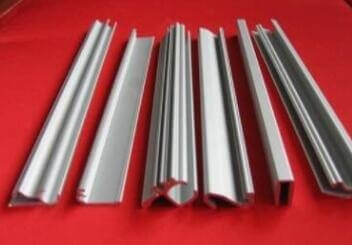- 0531-87887788

來源:http://m.gdjsdtc.com/ 發(fā)布時間:2020-03-20
將5052鋁板軋輥用的鋼錠在反射爐中熔煉,并進(jìn)行半連續(xù)澆鑄。為了滿足冷軋嚴(yán)格厚度控制(5微米)的要求,金屬打撈的化學(xué)成分必須控制在限制范圍內(nèi)。這是由于化學(xué)成分的變化的大影響了在x射線測厚儀的輸出即為每一批,標(biāo)準(zhǔn)的價值(價值)的金屬x射線吸收計算基于金屬的化學(xué)成分,且計算值送入的式冷軋機(jī)厚度控制系統(tǒng)必要的補(bǔ)償。
The ingot for 5052 aluminum plate roll is melted in the reverberatory furnace and semi continuous casting is carried out. In order to meet the requirements of strict thickness control (5 μ m) in cold rolling, the chemical composition of metal fishing must be controlled within the limits. This is because the change of chemical composition greatly affects the output of the X-ray thickness gauge, that is, the standard value (value) of the metal X-ray absorption calculation is based on the chemical composition of the metal, and the calculated value is fed into the necessary compensation of the cold rolling mill thickness control system.

控制金屬的含氫量,消除熔煉和鑄造過程中的非金屬夾雜物,一直是鑄造工程師關(guān)注的主要問題。圖2所示的在線脫氣過濾裝置是由鋁板制造商開發(fā)的。將氬氣和氮氣混合后,旋轉(zhuǎn)金屬中的正常氫氣濃度為0.15-0.20ml / 100g Al。鋁板制造商的實驗室開發(fā)了一種奇讀氣體分析儀。它已成功地用于該公司的在線脫氣和過濾系統(tǒng)。氣體分析儀是根據(jù)類似于Telegas儀器的熱物理原理設(shè)計的,并使用微處理器進(jìn)行計算。這些分析儀現(xiàn)在已經(jīng)可以在鋁板制造商之外的地方買到,并且得到了廣泛的應(yīng)用。
Controlling the hydrogen content of metal and eliminating the non-metallic inclusions in smelting and casting process are always the main concerns of foundry engineers. The on-line degassing filter shown in Figure 2 was developed by an aluminum plate manufacturer. After mixing argon and nitrogen, the normal hydrogen concentration in rotating metal is 0.15-0.20ml/100g al. A strange reading gas analyzer has been developed in the laboratory of aluminum plate manufacturer. It has been successfully used in the company's online degassing and filtration system. The gas analyzer is designed according to the thermophysical principle similar to that of the telegas instrument, and is calculated by microprocessor. These analyzers are now available outside the aluminum plate manufacturers and have been widely used.
為了消除或減少金屬熔體中的非金屬夾雜物,在線除氣器和過濾系統(tǒng)采用如圖3所示的多孔陶瓷管過濾器。過濾器可選用4個不同等級(孔隙率)的多孔陶瓷過濾器,如圖4所示,B類(Y—E類,有較厚的孔(非常細(xì)的孔)。根據(jù)板材的質(zhì)量要求來選擇陶瓷管的等級。通常使用中等孔隙率的C類陶瓷管,但D類陶瓷管孔隙率較細(xì),除金屬夾雜物外,用于消除電腦盤毛坯。實踐表明,即使熔化金屬被過濾,金屬偶爾也會受到從過濾器結(jié)構(gòu)材料上脫落的微小耐火材料的污染。從這個冷的意思X說,為了保證金屬的純度,避免夾雜污染,對流罐應(yīng)選擇合適的內(nèi)襯耐火材料。
In order to eliminate or reduce the non-metallic inclusions in the molten metal, the porous ceramic tube filter as shown in Figure 3 is used in the online degasser and filter system. Four porous ceramic filters of different grades (porosity) can be selected as the filter, as shown in Figure 4, class B (y-e, with relatively thick holes (very thin holes). According to the quality requirements of the plate, choose the grade of ceramic pipe. The medium porosity C-type ceramic tube is usually used, but the porosity of D-type ceramic tube is fine, which is used to eliminate the computer disk blank except for the metal inclusion. Practice shows that even if the molten metal is filtered, the metal will occasionally be polluted by the tiny refractory material falling off the filter structure material. In order to ensure the purity of the metal and avoid contamination by inclusions, the proper refractory lining should be selected for the convection tank.
為了生產(chǎn)出高質(zhì)量的陽極氧化板,鋼錠的微觀組織和金相組織必須是細(xì)小而均勻的。在鑄造過程中,鋼錠表面附近的熔融金屬應(yīng)以盡可能深和均勻的速度冷卻。常用熱頂鑄造,將陶瓷纖維板貼附在鋼錠內(nèi)部,如圖所示。
In order to produce high quality anodized plate, the microstructure and metallographic structure of ingot must be fine and uniform. During casting, the molten metal near the ingot surface should be cooled as deep and uniform as possible. Commonly used hot top casting, ceramic fiberboard is attached to the inside of the ingot, as shown in the figure.
以上是鋁板生產(chǎn)廠家為大家介紹的相關(guān)內(nèi)容,想要了解更多內(nèi)容,歡迎訪問網(wǎng)站:http://m.gdjsdtc.comThe above is the relevant content introduced by the aluminum plate manufacturer for you. To learn more, please visit the website: http://www.jndclyxgs.com